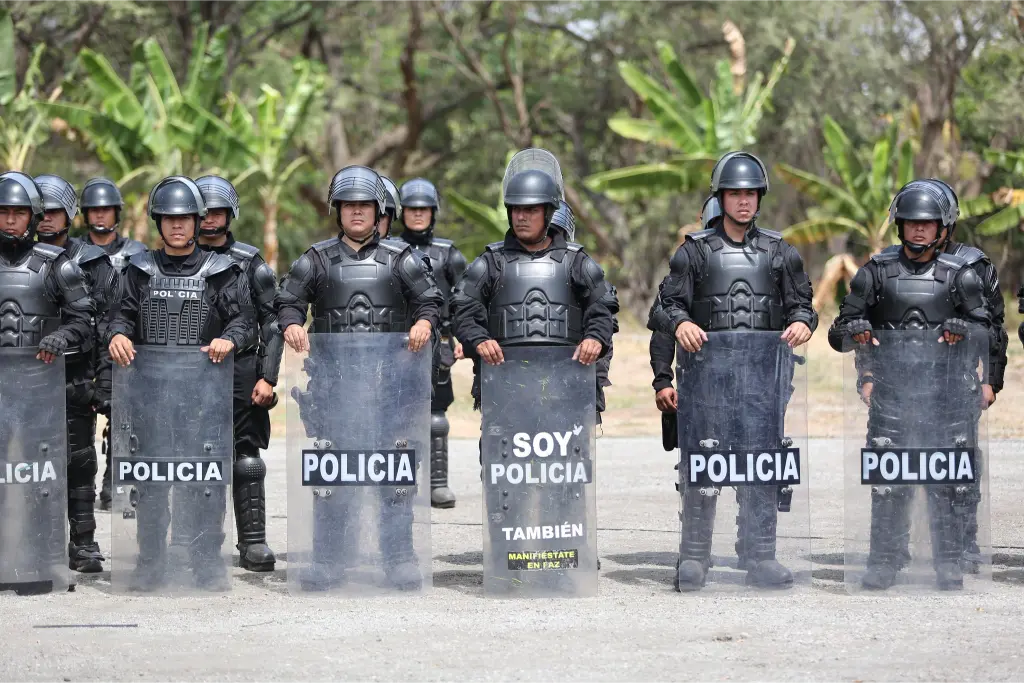Ecuador has initiated a sweeping national security operation resulting in nearly 900 arrests to quell a massive surge in gang violence, which erupted following the escape of a powerful drug lord from prison. On Tuesday, heavily armed gang members stormed a Guayaquil television station and took its journalists hostage live on air.
Ecuador’s President Daniel Noboa declared a state of “internal armed conflict” and labeled 22 criminal gangs as “terrorist” organizations. The government also announced new measures requiring foreigners entering from Colombia or Peru to provide a criminal record certificate. Noboa has noted that a significant portion of foreign prisoners in Ecuador are from Colombia, Peru, and Venezuela. The violence stems from criminal groups trying to assert their dominance in response to efforts to crack down on their activities, making use of Ecuador’s strategic location in the drug trade.
Ecuador was once known for peace, but it has become one of the most violent countries in South America.
Ecuador grapples with a host of domestic issues that are significantly aggravated by the presence of the US and European drug trade. Situated in close proximity to major drug-producing countries like Colombia and Peru, Ecuador has become a key transit point for drug cartels and traffickers seeking to move narcotics, particularly cocaine, to lucrative markets in the U.S. and Europe. This strategic geographic position, while beneficial for traffickers, has had detrimental effects on the nation.
One of the most profound consequences has been the infiltration of corruption throughout Ecuador’s law enforcement agencies, judiciary, and political institutions. The drug trade has induced officials to accept bribes, facilitating the smooth passage of illegal drugs. This corruption erodes public trust in government institutions, undermines the rule of law, and weakens efforts to address other pressing domestic issues.
The drug trade has also brought about an increase in violence and crime within Ecuador. Rival drug gangs frequently clash, resulting in violence that primarily affects urban areas. Major cities like Guayaquil and Quito have witnessed rising crime rates, posing significant security challenges and impeding economic development.
Furthermore, the illicit funds generated by drug trafficking often flow through Ecuador’s financial system, leading to money laundering activities that can distort the economy, fuel corruption, and exacerbate economic inequalities. These economic distortions, coupled with the social and health consequences of drug addiction, strain Ecuador’s healthcare system and social services.
Ecuador faces international pressure to combat drug trafficking. However, this can strain resources and divert attention from addressing other urgent domestic issues. International anti-drug policies may inadvertently exacerbate the problems by promoting militarization and aggressive law enforcement approaches.
The drug trade has a destabilizing effect on Ecuador’s economy, discouraging foreign investment and undermining legitimate businesses. Given the country’s limited resources as a developing nation, the financial burden of addressing drug-related problems falls heavily on the government, diverting resources from essential social programs and infrastructure development.
In the 1990s, Ecuador’s drug trade was primarily controlled by the FARC (Fuerzas Armadas Revolucionarias de Colombia), a Marxist guerrilla group, which provided stability and minimal conflict with the Ecuadorean state. However, significant changes occurred in 2016. The FARC demobilized in Colombia, creating a power vacuum in northern Ecuador. Simultaneously, there was a shift in cocaine demand, with a decline in the U.S. and a surge in Europe, leading to a quadrupling of cocaine seizures in Europe since 2016. This shift in demand made control of ports crucial, as cocaine destined for Europe was increasingly transported in shipping containers, rather than small planes from Colombia. Ecuador’s strategic location, particularly its major port city of Guayaquil on the Pacific coast, became attractive to cocaine smugglers, making it the epicenter of the violent crisis in the country.
Ecuador has thus experienced a significant rise in violence and insecurity, with various factors contributing to this crisis. Following the demobilization of the FARC in Colombia in 2016, a power vacuum emerged in northern Ecuador, and the shift in cocaine demand from the U.S. to Europe made control of ports more critical. This attracted foreign criminal groups, including Mexican cartels, Venezuelan gangs, and even the Albanian mafia, into Ecuador’s drug trade.
Ecuador’s two largest gangs, Los Lobos and Los Choneros, once maintained an uneasy peace but started splintering into factions after assassinations of gang leaders in 2020. Foreign criminal groups aligned with these factions, intensifying the turf war. Homicides in Ecuador, which previously had a low murder rate, skyrocketed since 2018, accompanied by bombings, assassinations, and shootouts. This wave of violence has led to comparisons with cartel violence in Mexican cities.
Efforts by the government, including increasing police presence and military deployment, have failed to contain the violence. Allegations of state actors facilitating organized crime further complicate the situation, with arrests of officials linked to organized crime, including a former drug czar and a judicial council president.
Noboa’s declaration of Ecuador’s “internal armed conflict” notwithstanding, experts warn that a militarized approach alone may not solve the issue, as it risks further human rights abuses and escalates the conflict. Addressing systemic corruption and state infiltration by gangs is crucial, and a regional approach to the international drug trade is needed. Some experts even suggest reevaluating drug prohibition as part of a broader strategy to combat organized crime and corruption.
Since the crisis in Ecuador is seen as a regional and international concern, given its connections to the global cocaine market and its potential to spread to neighboring countries, this emergency requires an international response.
The U.S. and Europe should immediately mobilize special troops to assist Ecuador and ensure the gangs are driven back and discouraged from taking control of the country. Ecuador’s future and stability will have a direct impact on the U.S. and Europe. Now is the time to fix the country before it is too late.
